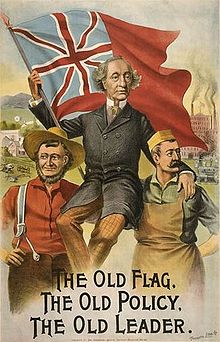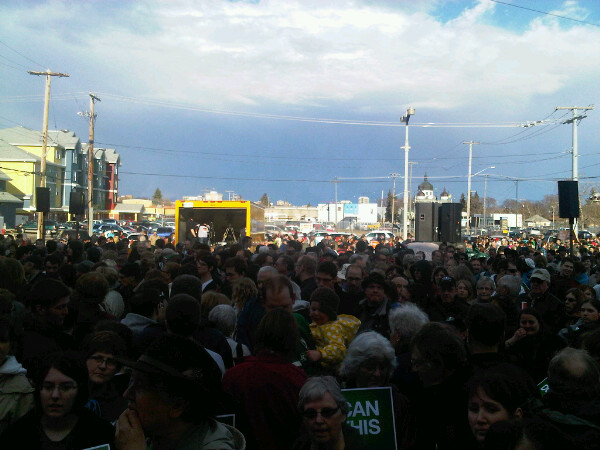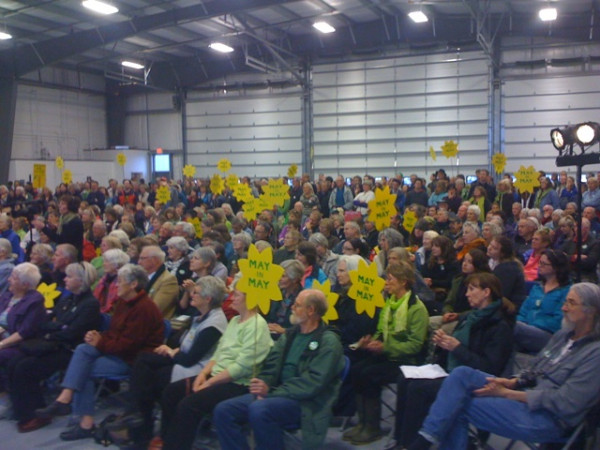 Canada has a federal election on May 2. While there is nothing new in that, there have been four called in the last seven years, this is already easily the most interesting one of the four. It started when MPs voted 156-145 to find the government in contempt of Parliament, a first in the history of the Commonwealth. They brought down the government on March 25 to force another election, something Prime Minister Harper called "a dangerous and unnecessary exercise." Harper's Conservative Party of Canada, a coalition between Canada's old right leaning conservative party and the newer and much farther right leaning Reform Party, has been governing with a precarious minority since 2006. Harper prorogued Parliament for three months in 2008 to avoid a vote of confidence, and once in 2010 to cripple the Afghan detainee investigation, and the government was still brought down twice.
Canada has a federal election on May 2. While there is nothing new in that, there have been four called in the last seven years, this is already easily the most interesting one of the four. It started when MPs voted 156-145 to find the government in contempt of Parliament, a first in the history of the Commonwealth. They brought down the government on March 25 to force another election, something Prime Minister Harper called "a dangerous and unnecessary exercise." Harper's Conservative Party of Canada, a coalition between Canada's old right leaning conservative party and the newer and much farther right leaning Reform Party, has been governing with a precarious minority since 2006. Harper prorogued Parliament for three months in 2008 to avoid a vote of confidence, and once in 2010 to cripple the Afghan detainee investigation, and the government was still brought down twice.
Michael Ignatieff, the leader of Canada's Liberal party, frequently referred to as "the natural ruling party of Canada" due to their time spent in power, said "There are only two alternatives here. More of this disrespect for democracy, more of this contempt for the Canadian people, or a compassionate, responsible Liberal government." That seemed a reasonable statement, considering that some form of the Liberal or Conservative parties (and once a coalition of the two) have governed Canada since confederation. So reasonable that he used it to rebut his opponents in the leadership debate; "But Jack, at least we get into government," he replied, although no one really was expecting anything other than another Harper minority or perhaps a Harper majority. (Harper renamed the government of Canada "the Harper Government.")
The best situation the people who hate Harper could envision was another minority government which would then be brought down again, but hopefully this time the opposition would form a coalition. People have turned to creative ideas for the Anyone But Harper campaign, including vote swapping and a huge amount of grass roots campaigning on social media and other venues. The Canadian and international media alike have decreed that voting for a party other than the big two was downright irresponsible as it would 'split the vote' and give Harper a majority. Harper is campaigning, not to be elected, but for a majority, and his attacks are directed primarily against a coalition.
The problem is, Canada is a traditionally liberal leaning country with a centre conservative element and neither of those options are currently available, despite the familiar party names. The Conservatives have been pulled much farther right than Canadians are accustomed to by the merger with the Reform party and the election of Harper as leader. The Liberals are currently led by a former Harvard professor who wrote in an op-ed in New York Times magazine on May 2, 2004:
"To defeat evil, we may have to traffic in evils: indefinite detention of suspects, coercive interrogations, targeted assassinations, even pre-emptive war. These are evils because each strays from national and international law and because they kill people or deprive them of freedom without due process. They can be justified only because they prevent the greater evil."
In Canada, Liberals do not usually advocate pre-emptive wars and torture. He has not been seen as an effective opposition, he has supported many controversial Conservative policies, including Canadian involvement in Afghanistan. He has never been able to attract enough support to have a realistic chance of being elected, and the anti-Harper dreams have been focused on a coalition government. Some thoughts on possible election results from Murray Dobbin:
A number of constitutional experts are already mulling over the possibility of what some refer to as a kind “informal constitutional coup” - Harper refusing to accept the results of a non-confidence vote. According to a Hill Times story quoting University of Ottawa constitutional law expert Errol Mendes, ignoring such a vote “…would amount to a sort of informal constitutional coup. Essentially that position he’s taking is he’s not the Prime Minister shackled by the will of the people, he’s the elected president of Canada.”
Queen’s University professor Ned Franks, stated: “If it’s early in the new Parliament, if it’s a defeat on a vote of confidence, the Governor General is entitled to inquire whether there is another person who would enjoy the confidence of the House.”
But Harper could delay the opening of Parliament, funding the government with special warrants through Order in Council and the Governor General. Running the government in this manner for six or eight months would provide Harper with the argument that the opposition parties were simply conspiring to defeat a government that had been functioning effectively for many months. And he then refuses to go.
But Canada actually has 18 parties registered in the current federal election, and four currently in the House of Commons. It has frequently been difficult to convince the governing parties and state media of this. In the last election, Green party candidate Elizabeth May was only included in the televised leaders debates after a public outcry, and this year the media consortium that decides such things excluded her successfully. With the last election, the Greens had lost their one seat in the House. Polls also unfairly exclude the minor parties from their questions, affecting voter response. The politically entwined media also do their bit to promote the two parties with ties to all things corporate in Canada.
But people do not seem to be listening. An 'endorsement' of Harper by the Globe and Mail has received so far 4,388 comments, primarily hostile. A week ago, it became apparent that something was happening with the perennial also-ran New Democratic Party which received 18.18% of the vote in the last election and currently holds 36 seats of 308 in the House of Commons. First pulling support from former Bloc Québécois supporters in Quebec, then climbing rapidly in British Columbia, the fifty year old party suddenly rocketed into second place, ahead of the Liberals.
In one day, between April 26 and 27, as the Conservatives dropped nearly six points in the polls from 46.9 per cent, the NDP support rose five points from 21 per cent.
Allan Gregg, chair of Harris-Decima polling firm said “This is unprecedented. In all the years I’ve been following federal elections, and I think this is my 11th, I have never seen anything like this. First, I’ve never seen a third party surge in the polls. And I’ve also never seen a party surge this much. Jack Layton and the New Democrats have doubled their popular vote since this election started ... and it’s not over yet.”
Both the Liberal and Bloc parties have coaxed former leaders out of retirement in an attempt to recapture public interest. Wikileaks has done their part by releasing 1800 new cables to help voters make an informed decision. And crowds in Canada are ignoring all the mainstream media as they choose parties they believe in instead of the two they were told were the only choice.
Picture credit to CBC National reporter Rosemary Barton "Uh. Yeah. This is an NDP rally in Saskatoon."

Green rally via @CamilleLabchuk

Voter turnout had been plummeting in the last elections, with only 58.8% bothering to show up in 2008. After the advance polls this Easter weekend, Susan Friend, a spokeswoman for Elections Canada, said “This is the biggest voter turnout at an advance poll ever.” There are vote mobs being organized across the country, particularly at universities. Whatever happens on May 2, one thing has already happened in Canadian politics; the effective two party system is gone.
Theme by Danetsoft and Danang Probo Sayekti inspired by Maksimer
The lack of WikiLeaks material on Canada is troubling.
It either suggests some filtering device in WikiLeaks releases, or the existence of 'back channels' between
Ottawa and Washington which make diplomatic analysis unnecessary.
Given the ongoing push to merge Canada into the United States and the Canadian Prime Minister's obvious vested interest in this process, there must be a great deal of communication on the subject. Why are there no cables on the subject?